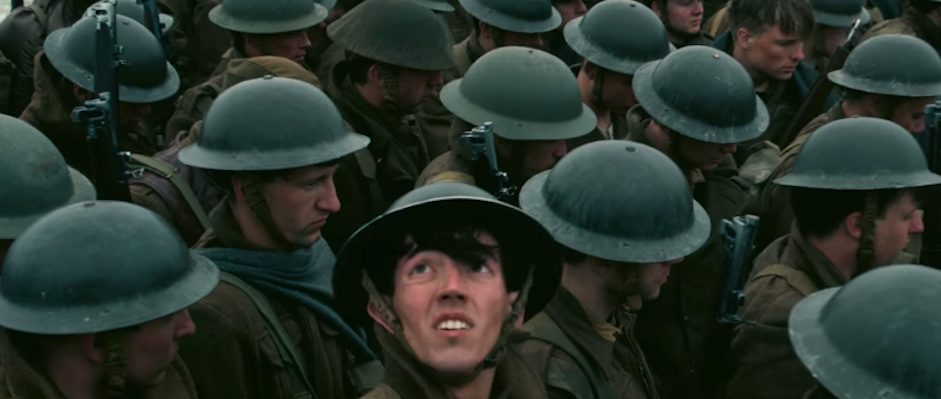Review: 'Dunkirk' is a Thrilling Ride

Jacqueline Gualtieri ’17/ Emertainment Monthly Staff Writer
Christopher Nolan never makes his movies easy on his viewer. Each movie requires the audience’s thought, emotion, and, in the case of Dunkirk, anxiety. Nolan’s newest blockbuster can best be described as an anxious masterpiece. The audience may find that, as the movie comes to an end, they will have forgotten to breathe since the first scene. In addition, they may find themselves left with a knotted stomach, a palpitating heart, and teary eyes.
From the very first scene, Nolan shows that he’s going to do more than make a war movie. Every bomb, every gunshot, is loud enough to shake the theater. The audience is not watching war happen; they are meant to be in the middle of it. The viewer is in the plane, dive-bombing, just as they are left stranded on a beach, with enemy pilots overhead, just as they are submerged in a sinking ship. Every story is so real, one can feel the water on their face and smell the fires around them.

Dunkirk is comprised of three stories, three different levels of time, similar to the three levels of the dream that is created in Inception. But each story interconnects and overlaps. Throughout the film, the plot goes from one story to the next, only adding to the overall tension of the movie. When the audience finally feels like they can rest, Nolan just cuts to the next story, where something stressful and tragic is sure to be happening. The audience is never allowed to get too comfortable. The score helps with creating this feeling as well. From the moment the first action in the movie starts, the score changes, picks up speed, but also adds an underlying ticking clock. It’s only when the clock finally stops in the end that one really realizes it was even there at all. It quietly ticks away, driving up the tension and creating the ever-constant reminder that the soldier must race against the clock to survive.
Because there are three stories, there’s not too much screen time for any one person, save for one character. Tommy (Fionn Whitehead) is where the movie starts and ends. Whitehead is a part of every story, to some degree, but so are all the soldiers and the pilots and the captains. He is, however, the soldier who is Nolan’s focus, the one that the film follows more than anyone else. Although Whitehead is barely out of his teens and only has one other acting credit under his belt, he, along with other acting newcomer Harry Styles, has the stand out performance. His and Styles’ turns are memorable and strong. They play nearly polar opposites: one exposing the way that the war can twist a soldier and the other one a beacon of strength and righteousness in the face of the turmoil that surrounds him.
Dunkirk is the type of movie that leaves one with their heart in their throat, which only shows the talent that Nolan has in making his audience feel exactly what he wants them to feel. In this case, it’s anxiety, because of time and because of war, both are interconnected in an unchangeable way. It’s a stomach-churning, heart-wrenching time from start to finish, but worth every anxiety-ridden moment.
Overall Grade: A
Watch The Trailer: [embedyt] https://www.youtube.com/watch?v=F-eMt3SrfFU[/embedyt]